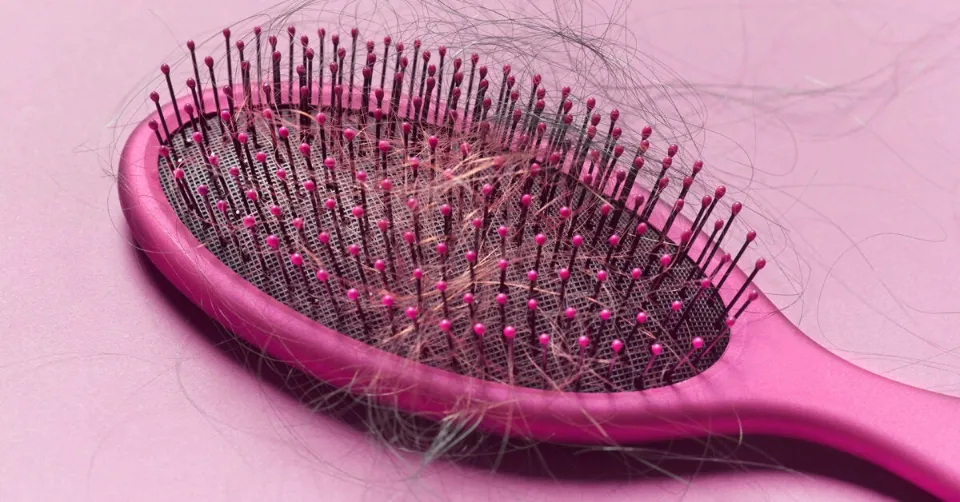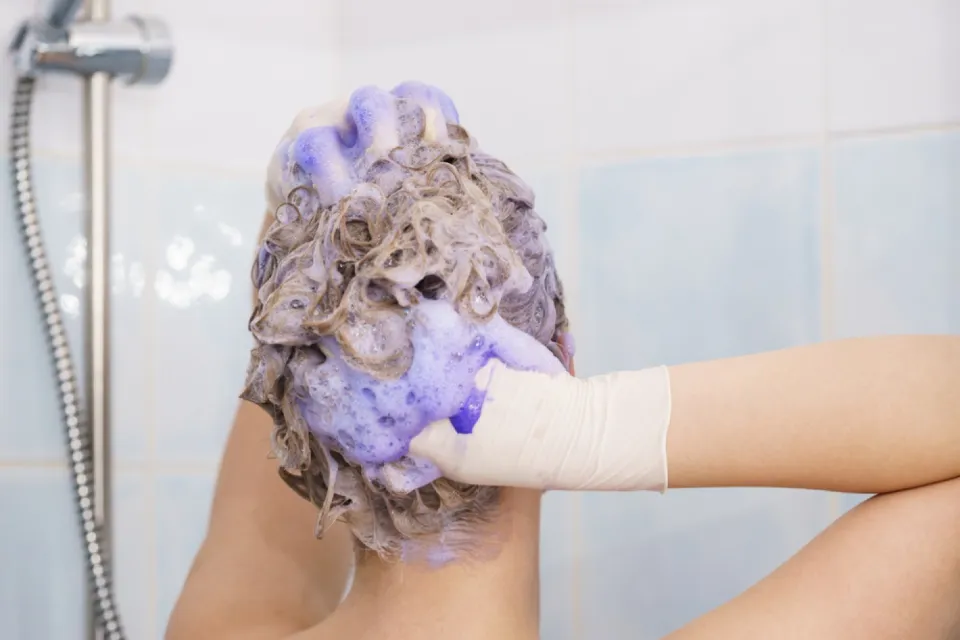If you’ve recently gone under general anesthesia for a medical procedure and have noticed a few more hairs than normal, you may be wondering, “can anesthesia cause hair loss?”
Cases of sudden, excessive shedding of hair, including hair loss due to general anesthesia, can be grouped under a condition called telogen effluvium. Fortunately, telogen effluvium usually only lasts a short time and goes away on its own.
In addition to outlining some strategies for managing post-anesthesia hair loss, this article explores how surgery and anesthesia may affect hair growth.
Can Anesthesia Cause Hair Loss?
There’s not a lot of research on the link between anesthesia—the use of medicines to prevent pain and discomfort during medical procedures—and hair loss.
But we do know that stress can cause temporary hair loss, and surgery, often done under general anesthesia, can put you under a lot of physical and emotional stress.

Therefore, it probably makes more sense to refer to post-surgery hair loss rather than post-anesthesia hair loss when discussing anesthesia and hair loss.
The good news is that a surgical procedure doesn’t always cause hair loss; most of the time, hair loss following anesthesia and surgery is temporary. The most common type of hair loss is telogen effluvium (TE).
Common Signs of Telogen Effluvium
Telogen effluvium typically appears when your entire scalp experiences excessive shedding, unlike male pattern baldness, which gradually results in a receding hairline or bald patch near the crown.
A few months after being put under anesthesia for surgery, someone who has telogen effluvium may experience an abrupt, sudden loss of hair.
The majority of the time, this diffuse pattern of hair loss will affect your entire scalp, giving your hair a thin, low-density appearance.
Especially in bright light or when your hair is wet, you might find that it’s simpler to see your scalp through your hair.
The onset of telogen effluvium hair loss typically occurs two to three months after a particular event, such as surgery or anesthesia exposure.
Your hairs will enter a resting state in the months after the initiating event but before they shed.
New hairs that grow from the follicles will cause the old hairs to shed as the hairs reenter the anagen phase of the hair growth cycle, resulting in this sudden, abrupt thinning.
Will Hair Loss from Anesthesia Grow Back?
Yes, in most cases, TE is only temporary, and your hair will grow back. Male pattern baldness and permanent hair loss are not known to result from anesthesia or surgery.
For some individuals, though, other elements—such as certain medical conditions or genetics—could delay or prevent the return of normal hair growth.
You Might Also Like:
- Does Lupus Cause Hair Loss?
- Does Pomade Cause Hair Loss?
- Does Pantene Cause Hair Loss?
- Does Alcohol Cause Hair Loss?
- Does Mounjaro Cause Hair Loss?
- Does Creatine Cause Hair Loss?
- Does Dandruff Cause Hair Loss?
- Does Losartan Cause Hair Loss?
- Does Metformin Cause Hair Loss?
- Does Minoxidil Cause Hair Loss?
- Does Metoprolol Cause Hair Loss?
- Does Wellbutrin Cause Hair Loss?
- Does Prednisone Cause Hair Loss?
- Does Phentermine Cause Hair Loss?
How to Treat Hair Loss from Surgery?
If you’re anxious to see your hair return to normal, the tips below may help speed up the process.
Reduce Stress
The amount of hair you lose can be significantly increased by engaging in stressful activities. Although there may not be any concrete evidence linking stress to hair loss, it could be a sign of distress coming from other parts of your body.
In most cases, stress can have an impact on your hair follicles and reduce the functionality of your system. Reduce stress, and improve your hair
Use the Right Shampoo and Styling Technique
Shampoos and other products are not available to treat TE directly. However, high-quality shampoos and styling methods can aid in protecting your hair.
Hair products with certain chemicals, such as sulfates or bleach, can harm your hair follicles and increase your risk of developing hair loss (Mysore, 2019; Bloch, 2019). Try to treat your hair gently when applying your shampoo, and make sure to thoroughly rinse it out.
Hair loss can be avoided by upholding healthy styling practices. Avoid using appliances with high heat on your hair, such as curling irons.
Hair Loss Treatments
A topical treatment called minoxidil, also referred to as Rogaine, is applied directly to the scalp to encourage hair growth. It is approved for both men and women who have androgenic alopecia, also known as male or female pattern hair loss.
Although some individuals may choose to try minoxidil for TE, there is currently no conclusive scientific proof that minoxidil speeds up the recovery from TE hair loss (Hughes, 2021). However, in theory, it might support hair growth, and some people might prefer actively taking action to try to assist.
How to Prevent Hair Loss After Surgery?
If you are worried about hair loss following surgery, be sure to discuss your concerns with your healthcare provider before the operation.
To aid in preventing post-operative hair loss, they can offer advice and talk about additional preventative measures.
Unfortunately, some hair loss cannot be stopped. Still, you may be able to lower your risk for hair loss after surgery and support your overall wellness by (Asghar, 2020):
- Managing emotional stress with relaxation techniques like deep breathing or talking with loved ones
- Exercising regularly to help keep your body healthy
- Getting enough sleep to help your body heal after surgery and maintain your health
- Eating a healthy diet full of vitamins and minerals to prevent any deficiencies; this helps ensure your body has all of the fuel it needs to grow hair and help you heal after surgery.
Takeaway: Can Anesthesia Cause Hair Loss
If you’ve had surgery and were under general anesthesia within the past few months and start experiencing thinning hair, it’s possible TE is the cause.
If you start losing your hair after surgery, speak with your doctor about any queries or worries you may have.
FAQs
How Long Will Hair Fall Out After Anesthesia?
It usually occurs two to three months after a significant bodily stress, such as a major operation, a long-term illness, or a serious infection. This is the most common type of hair loss.
What Are Effects of Anesthesia on Hair and Skin?
Headache, nausea, and drowsiness are possible sedation side effects, though they are less common than with general anesthesia.
What Are the Side Effects of Anesthesia?
- Feeling or being sick.
- Dizziness and feeling faint.
- Feeling cold or shivering.
- Headaches.
- Itchiness.
- Bruising and soreness.
- Difficulty peeing.
- Aches and pains.




